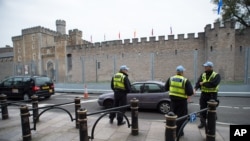The 28 NATO leaders are gathering in Wales, in western Britain, for their first summit in two years, amid a new and challenging array of crises.
In 2012 in Chicago, they focused on Afghanistan, and continued the decades-long process of redefining the alliance for the post-Cold War world. They discussed issues like nuclear weapons proliferation, extremist violence, the Syrian civil war and missile defense.
But the threats were distant or theoretical, leaving NATO to struggle to articulate a compelling mission, and to convince its own people to spend more on defense.
This summit “will take place in a changed world,” according to NATO Secretary-General Anders Fogh Rasmussen.
Ukraine, Islamic State
NATO is being challenged by Russia in Ukraine and by the newly prominent Islamic State militant group in Iraq and Syria. Leaders are also concerned about the Ebola outbreak in Africa, China’s increased assertiveness in Asian border disputes, and fallout from the Syrian civil war, in addition to all of the less urgent issues of two years ago.
The problem, experts say, is that the world’s strongest military bloc finds itself unable to address any of those issues decisively.
“There isn’t a whole lot that NATO can do about this push-back by Putin,” said former British official Nick Witney, now at the European Council on Foreign Relations. “Maybe we in the West should console ourselves that before Putin started pushing back, we have, over the last two decades, pushed Russia a hell of a long way in the other direction.”
Indeed, NATO has absorbed all the former Soviet satellite states of Eastern Europe. But Russian President Vladimir Putin is drawing the line when it comes to actual former members of the Soviet Union, like Georgia and Ukraine.
To stop Ukraine from moving to join the European Union, and ensure it never joins NATO, Putin annexed Crimea and invaded eastern Ukraine in support of a separatist rebellion he instigated. Since Ukraine is not a NATO member, the alliance has no obligation to help, and no wish to get into a war with Russia.
“[Russia] is not going to let go of its ability to influence events in Ukraine, and there frankly isn’t a whole lot we can do about it,” Witney said.
Summit agenda
Instead, NATO is planning a series of steps - to be formalized at the summit - to demonstrate its support for its relatively new eastern members and to improve its ability to respond quickly if Russia moves against any of them. That will involve creating a quickly deployable force, and stationing supplies and some personnel on bases near its eastern borders.
“We are faced with the reality that Russia considers us an adversary, and we will adapt to that situation,” Rasmussen said at a pre-summit news conference.
Regarding the Islamic State, which threatens the stability of Iraq and has been brutalizing non-Sunni Muslims in areas it controls, “specifics ... are going to be very hard to deliver,” said Robin Niblett, the director of London’s Chatham House.
The United States has been bombing Islamic State fighters, to help Iraqi and Kurdish forces fighting them on the ground. And U.S. and other allied military aircraft have dropped relief supplies for trapped and besieged civilians. But it is not a NATO mission and is not expected to become one.
The summit is expected to call for more steps to fight the spread of extremism and to support Iraq’s new government, which is now being formed, but not much more.
Afghanistan
The leaders will also review progress toward ending the NATO combat mission in Afghanistan at the end of this year, and deploying several thousand trainers and advisers. But that can’t happen until Afghanistan’s new president signs an agreement on the status of the new force, and a controversial recount of ballots is still in progress.
As always, NATO leaders will agree on various moves to try to increase the alliance’s military capability, to enable their forces to work together and to confront threats like missile proliferation and cyber attacks.
But Robin Niblett says the Ukraine and Iraq crises may have provided the leaders with a theme to tie such issues together, and to get the attention of their people.
“It is a critical summit,” he said. “It was all theoretical ... the world was not perceived to be as dangerous a place to the West as it has turned out to be. This is a summit in which all NATO members and their partners need to step up and start to communicate to themselves and externally and to their publics - this is a dangerous world and there is a purpose to this alliance.”
CARDIFF, WALES —




